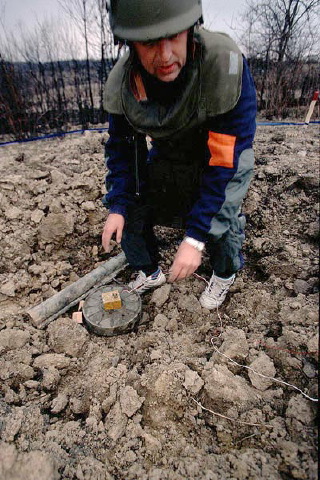 |
  
bb-mine-027.jpg
Deminers in Bosnia have to stab around two thousand times at an angle of fifteen degrees in a square meter of the soil. They are obliged to work as if the earth was saturated only by the smallest mines possible, as it is for example the "gorazdanka" (the local mine produced in a town of Gorazde) containing only four grams of the explosive and measuring only two inches in width. When the mine is detected, it is brought to a safe place where it is blown up. When this is too dangerous, however, the mine is destroyed on the spot. More than 80 percent of all the mines that lie in the Bosnian soil are antipersonnel ones, the others being antichar. A great majority of them came from the old Yugoslav military factories, but some were brought there from all over the world or manufactured in local workshops. The latter were named after their production sites: thus the Muslims designed above mentioned "gorazdanke", while the Croats constructed "capljinke", which got their name after Capljina, the town in Herzegovina. However, for each of them, deminers found a proper pet name. Thus the smallest round-shaped one is called the "p_té" because it looks like locally popular tin cans of liver- p_tés and is activated when stepped on; similarly, "sardines" look like sardine-tins and belong to the same type of mines. The most dangerous ones are "promdzije" (the name comes from the official Yugoslav Army code name PROM) that first leap in the air and then explode at the breast-height, ejecting up to 2,500 metal splinters in the radius of 360 degrees. The bullet-proof vest is of no help here, while the "p_té", at the very best, only blows up the victim's foot.
When the mine is detected, it is brought to a safe place where it is blown up.
|